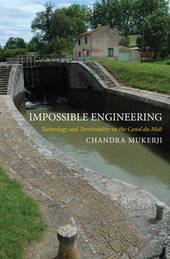
|
Impossible Engineering: Technology and Territoriality on the Canal du Midi
Hardback
Main Details
Description
The Canal du Midi, which threads through southwestern France and links the Atlantic to the Mediterranean, was an astonishing feat of seventeenth-century engineering - in fact, it was technically impossible according to the standards of its day. This book looks at the mystery of its success as well as the canal's surprising political significance.
Author Biography
Chandra Mukerji is professor of communication and science studies at the University of California, San Diego. She is the author of "Territorial Ambitions and the Gardens of Versailles, A Fragile Power: Scientists and the State" (Princeton), and "From Graven Images: Patterns of Modern Materialism".
ReviewsCo-Winner of the 2012 Distinguished Scholarly Publication Award, American Sociological Association Honorable Mention for the 2010 Mary Douglas Prize for Best Book in the Sociology of Culture Section category, American Sociological Association "[T]his is a scintillating blend of cultural, political, and technological history."--Choice "Mukerji opens a new chapter in the history of the Canal du Midi, aiming to deepen understanding of its design and construction, and also of the related social and gender patterns. Furthermore, this important book also both stresses the concept of distributed knowledge/collective intelligence, and provides a deeper understanding of the impersonal power of structures. Mukeji demonstrates the necessity to pursue studies such as this with an open mind and a critical attitude."--Michel Cotte, Reviews in History "Impossible Engineering is an insightful meditation on the nature of stewardship, the sociology of knowledge, and the role of accountability in seventeenth-century France, and an extraordinary proof of how rich and challenging the history of material constructions can be."--Sophus A. Reinert, Economic History Review "Mukerji's analysis of the building of the canal is a tour de force of both historical and sociological research. Based on extensive and imaginative archival research and also on astute observation of the built landscape, it is written in vigorous prose and illustrated by the author's beautiful and informative photographs. It ranks as a significant and highly original contribution to historical and cultural sociology."--William H. Sewell, Jr., American Journal of Sociology "Chandra Mukerji crosses intellectual and disciplinary boundaries with incredible ease, mobilizing a vast array of scholarship to tackle historical cases in a new way."--Frederic Graber, Technology and Culture
|